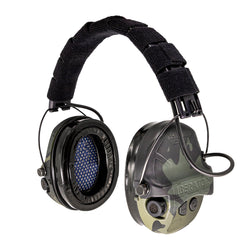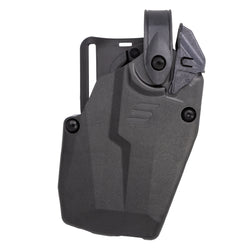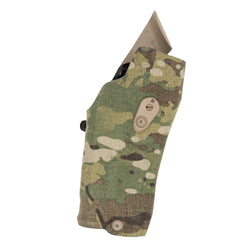Established in 2020, the “Project Officer Survival” mission is to provide free Law Enforcement firearms training via support from our industry partners, using corporate or private tax-deductible donations through 501c3 nonprofits we have partnered with. We want to increase their survivability at little to no cost to the individual officers.
Some stats: 378 Law Enforcement Officers (LEOs) were shot in the line of duty during 2023. A total of 46 LEOs died in 2023 as a result of being shot in the line of duty.
To date, Project Officer Survival has trained hundreds of LEOs and three officers directly correlated their training during a Project Officer Survival course to them surviving the deadly force encounter.
Course Objectives
- Give LEOs a skill set to be efficient and effective if they are ever in a deadly force encounter.
- Empower our officers while on the range to think for themselves.
- Build a proper mindset and solve problems so the “real world” encounters are easier.
- Equip them with a tool via The Firearms Training Notebook to continue training after the course.
- Encourage them to Be 1% Better Everyday!

The “GATOR” Event
On June 6-7th 2024, Rick Hogg owner of War HOGG Tactical conducted FREE Law Enforcement Firearms training via Project Officer Survival. The Inaugural Project Officer Survival “GATOR” Training / Vendor event was held at the Element Training Center in Holt, Florida.
Walther Arms, Aimpoint, and Safariland supported this FREE 1-day red dot pistol Law Enforcement Firearms Training event. The students were outfitted in Propper clothing for the event.

The intent of this training event was multipart:
- To educate LEOs on the different types of red dot sights, and to get them a day of training using an Aimpoint ACRO equipped Walther PDP pistol, drawing out of a Safariland Holster.
- To bring awareness to the firearms industry about Project Officer Survival and to gather support for future Project Officer Survival Events.
- To provide law enforcement, military personnel, and law-abiding citizens the opportunity to try out some of these vendors’ products.
The “GATOR” event was a couple of months in the making. We picked The Element Training Complex in the panhandle of Florida. This location was picked with easy reach to Georgia, Alabama, and Mississippi for our law enforcement students and near numerous military installations.
Vendors
The afternoon of June 5th, vendors arrived at The Element Training Complex to set up their respective vendor tables/areas. Marathon Targets, ICC Ammo, Aimpoint, Walther Arms, Grizzly Targets, Shooting Targets USA and Cobalt Kinetics set up on Bay 2 for live-fire practical application of their products.
Kontek Industries brought their mobile shoot house out and had it across from the vendors in Bay 2. Kontek was supported by Force on Force munitions. Safariland, Propper, Sub Second, Whiskey 7, and Ricky Harris Designs set up away from the live fire bays under a very large overhang.
Project Officer Survival training was set up in Bay 1 with the support of Grizzly Targets Shoot No Shoot (SNS) target system.
Event Donors
- Notch Gear with War HOGG logo hats
- Hoist to hydrate both students and people visiting the vendors
- XS Sights
- Kore Essentials
- ESCA Tech provided D-Lead wipes and soap for both students and vendor event attendees.
- PACT, Inc. provided a club timer III and case for the winner of the shooting competition.

Logistics
The training days on June 6th and 7th began promptly at 8 a.m., bringing together 12 law enforcement officers from Florida, Georgia, and Alabama. The session kicked off with sizing the officers’ hands to ensure a proper fit for Walther PDP pistols, including the professional, full-size, compact, and F-Series models equipped with Aimpoint ACRO red dot sights. Safariland Level 3 retention holsters and mag pouches were also distributed to set them up for success during the training.
Participants came prepared with 400 rounds of 9mm ammunition, eye and ear protection, a belt for their holsters, and an old t-shirt suitable for range use. Despite a rainy forecast on June 6th, the enclosed design of the Aimpoint ACRO proved its reliability, demonstrating to the officers that adverse weather conditions would not impede their performance.
Each student received a SWAG bag with a copy of The Firearms Training Notebook, a custom War HOGG hat from Notch Gear, ESCA tech provided D Lead wipes and soap, a Hoist hydration beverage, a multitasker tool or mag pod, a bottle opener from Grizzly Targets and literature from different manufactures.

Intros
The training began with introductions from War HOGG Tactical and Walther Arms. I asked the students to do a couple of things throughout the day. The first was to not be afraid to change things about their shooting. I would give them some generalities, but they would have to figure some things out based on their individual biomechanics. I tell them, “If you do what you always done, you are going to get what you always got.”
The second was to approach this “flat range” as if they were on the street. I was trying to get a mind shift in these law enforcement officers. I do the same things for my civilian and military courses.
Next Rick DeMilt from Walther’s Law Enforcement division gave the students a brief about the PDP and showed them a cutaway of the Walther barrel equipped with a step chamber, one of only two firearms manufacturers that have a step chamber.
Overview of Red Dot Sights
For me, this is a critical part of the course because too many law enforcement agencies are uneducated on red dot sights — or as I like to call them, pieces of life-saving equipment.
Agencies are not putting the time in to conduct a thorough T&E process. I discussed the issues with an open emitter red dot sight. You have a failure point built into the sight with an exposed emitter. I then talk about the failure-point gizmos some manufacturers place on their optics, like solar panels and shake-awake systems.
Then, we turn to enclosed-emitter sights, specifically the Aimpoint ACRO and its durability. From there, we covered dot brightness, zeroing the optic, and shooting as soon as the dot is on target. Too many shooters transitioning to the red dot sight think the optic housing has something to do with aiming, like lining up iron sights. It does not.

Performance on Demand
The training started with the War HOGG Self Eval, shot individually, from the 5-meter line at their ready position on a 3×5 and 4×6 index card using a PACT club timer to record data. This was the first piece of data we collected for The Firearms Training Notebook.
The Firearms Training Notebook is a critical component to all of War HOGG Tactical training courses. The intent is to give the student data so when they leave the course they can see where they need to improve on their marksmanship and gun handling skills.

Instruction Phase
After shooting the War HOGG Self Eval, I give the students a series of instructions, starting with my War HOGG administrative pistol loading procedure.
It starts with identifying a safe area, drawing the Walther PDP from my Safariland holster, defeating the Level 3 retention, and presenting the pistol in a safe direction. This gives me a chance to check the red dot brightness and ensure my iron sights are in working order. Yes, I have seen some students missing a front or rear sight.
Next is locking the slide to the rear and conducting a speed magazine change, with another pistol presentation. I then conduct a “War HOGG” check (press check), holster my pistol with my thumb on the rear of the pistol to ensure it does not get knocked out of battery, and raise my hood up so all retention devices are activated.
The final step is bringing a new magazine into the first position on my magazine pouch. Then, I cover unloading the pistol.
Next, I give my students a class on pistol malfunctions, the fundamentals of pistol marksmanship, really focusing on getting a good grip on the pistol, and the red dot pistol presentation. The ability to have an efficient presentation is critical in acquiring the red dot to have the ability to fire sooner versus “fishing” for the red dot.
The Training Day
We start with some dry fire on pistol presentations and move on to single-shot presentations on a 3-inch dot.
Using a building block instruction methodology, the students moved on to controlled pairs. From there we talked about magazine changes and conducted both dry and live-fire speed magazine changes. We finished the morning with drawing from the holster.
After each block of instruction we captured data for the students using a Pact Club Timer and The Firearms Training Notebook so the students had data to take back with them to improve their marksmanship ability.

Lunch Break
We did a quick room-clearing class on the Kontek Industries mobile shoot house. The food truck Brunch with a Twist was out fueling our students and individuals who came out to check out the vendors. Grizzly Targets provided lunch for day one and Propper for day two. This way the students could stay on site to check out the different vendors.
Afternoon Session
The afternoon started on 8-inch plates for a 5-shot drill at 5, 7, and 10 meters. I’m not a fan of cadence drills. Instead, I tell my students “The dot gives you permission.” We then collect some more data for their notebooks on their 5-shot performance at 5, 7, and 10 meters. The students conduct a down dot drill and we introduce them to shooting strong and support hand.
Putting it all together
Adding Realism to Training
For all our courses we ask our students to bring out a t-shirt that they can shoot to add one more layer of realism to their training. I have them shoot multi-shot engagements at various distances. I pause the group because there is a teaching point that needs to be made about shot placement. Then the students finish the drill with this information and typically we see two distinct shot groups.
The final drill of the day is shooting under physical duress. This drill is a staple of all of Project Officer Survival and is accomplished using sandbags for various exercises. The focus is on marksmanship with each miss adding 10 seconds to their overall time.
It Pays To Be A Winner! For the winner, there are some great prizes from our industry partners.

conclusion
With the support from Walther, Aimpoint, Safariland, and Propper, 24 Law Enforcement Officers from Florida, Georgia, and Alabama are now better trained with red dot pistol. These officers can take that information back to their agencies and help the process of purchasing rugged and reliable pieces of life-saving equipment. If your agency is interested in red dot pistol training reach out to us via warhogg.com.
Train Hard, Stay Safe and see you “On The Range” – Rick









